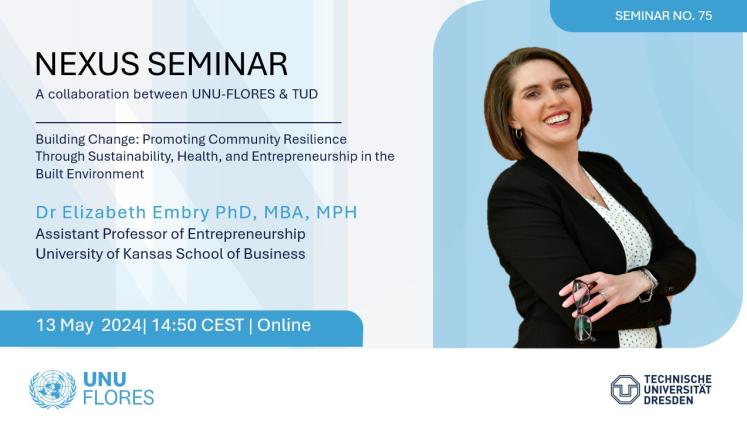Environmental sustainability, with a focus on climate change, has become a critical consideration for organizations. Management and entrepreneurship scholars have examined the creation and adoption of sustainability practices, but this research remains isolated from other relevant social concerns and has yet to deeply address factors that drive maintenance and survival to move toward resilience and regeneration.
The focus of Dr. Embry’s research is an exploration into the evolution and innovation of sustainability practices, and when and how these solutions might complement or become integrated with addressing broader societal issues. In this presentation, Dr Embry will present an overview of recent work on adaptations and innovations to existing sustainability measures in the built environment when challenged by concerns of racial and gender equity, and public health.
The built environment – the human-made spaces where we live, work, and play, which has significant implications not only for the natural environment, but also the health, wellbeing and productivity of the humans who inhabit it. Dr Embry will delve deeper into a grounded theory study of intentional real estate development. This research shows how innovation intended to preserve the natural environment simultaneously protected the community residents in an unforeseen crisis. This study presents a model that may be more tenacious than existing forms of resilience established by government or policy edicts. As the impacts of climate change continue to increase, it is essential that current approaches to environmental sustainability advance toward resiliency, and ultimately account for intersectional issues.
About the Speaker: Dr Elizabeth Embry, PhD MBA MPH
Elizabeth Embry is an Assistant Professor in the Management and Entrepreneurship area at the University of Kansas School of Business. She researches entrepreneurial opportunities to address the pressing social issues of our time. With a background in public health and disaster management, she specially focuses on innovations in the built environment to address climate change. Beth earned her doctoral degree in entrepreneurship and strategy from the University of Colorado Boulder. Additionally, she holds a Masters of Public Health from Boston University and Masters of Business Administration from Saint Louis University. Prior to her work in academia, Beth was the Director of Global Health at Saint Louis University’s College for Public Health and Social Justice. She has also worked in a variety of global contexts focused on health system strengthening, program development, and capacity building for complex humanitarian aid.
Background of the Series:
UNU-FLORES, in collaboration with PRISMA – Centre for Sustainability Assessment and Policy on behalf of TU Dresden, is excited to announce the Nexus Seminar Series. The joint seminar series, which launched in 2015, features lectures by senior scholars and successful practitioners that highlight all dimensions of research on the Nexus Approach, ranging from hands-on implementation strategies to theoretical debates. The Nexus Seminars serve not only as a platform for scientific exchange and cooperation between UNU-FLORES and TU Dresden but also as a medium for the partner institutions to discuss their research with a broader audience. The Nexus Seminar, which takes place monthly during the academic semester, is open to the public and delivered virtually through online webinars.





